|
|
|
Sort Order |
|
|
|
Items / Page
|
|
|
|
|
|
|
| Srl | Item |
| 1 |
ID:
099109
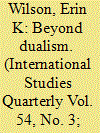

|
|
|
|
|
| Publication |
2010.
|
| Summary/Abstract |
The world's religions have strong traditions of contributing to theories and practices around justice. Recent debates on global justice within International Relations (IR), however, have largely overlooked possible contributions from religion. This article explores why religion is neglected, despite its potential for constructive involvement in the pursuit of global justice. I argue that dominant macro-level conceptions of both global justice and religion within IR have been limited by dualism. Combining Kristeva's (1986) reading of Bakhtinian dialogism and Prokhovnik's (2003) relational thought, I propose expanded understandings of both religion and global justice that move beyond dualism. These expanded understandings open up creative ways for IR scholars and practitioners to engage in processes aimed at overcoming global inequalities and injustices.
|
|
|
|
|
|
|
|
|
|
|
|
|
|
|
|
| 2 |
ID:
086455
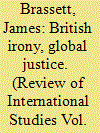

|
|
|
|
|
| Publication |
2009.
|
| Summary/Abstract |
The article provides a critical analysis of the concept of irony and how it relates to global justice. Taking Richard Rorty as a lead, it is suggested that irony can foreground a sense of doubt over our own most heartfelt beliefs regarding justice. This provides at least one ideal sense in which irony can impact the discussion of global ethics by pitching less as a discourse of grand universals and more as a set of hopeful narratives about how to reduce suffering. The article then extends this notion via the particular - and particularly - ethnocentric case of British Irony. Accepting certain difficulties with any definition of British Irony the article reads the interventions of three protagonists on the subject of global justice - Chris Brown, Banksy and Ricky Gervais. It is argued that their considerations bring to light important nuances in irony relating to the importance of playfulness, tragedy, pain, self-criticism and paradox. The position is then qualified against the (opposing) critiques that irony is either too radical, or, too conservative a quality to make a meaningful impact on the discussion of global justice. Ultimately, irony is defended as a critical and imaginative form, which can (but does not necessarily) foster a greater awareness of the possibilities and limits for thinking/doing global justice.
%''The comic frame, in making a man the student of himself, makes it possible for him to 'transcend' occasions when he has been tricked or cheated, since he can readily put such discouragements into his 'assets' column, under the heading of 'experience'. . . . In sum, the comic frame should enable people to be observers of themselves, while acting.
|
|
|
|
|
|
|
|
|
|
|
|
|
|
|
|
| 3 |
ID:
077444
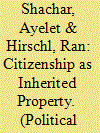

|
|
|
|
|
| Publication |
2007.
|
| Summary/Abstract |
The global distributive implications of automatically allocating political membership according to territoriality (jus soli) and parentage (jus sanguinis) principles have largely escaped critical scrutiny. This article begins to address this considerable gap. Securing membership status in a given state or region- with its specific level of wealth, degree of stability, and human rights record- is a crucial factor in the determination of life chances. However, birthright entitlements still dominate both our imagination and our laws in the allotment of political membership to a given state. In this article we explore the striking conceptual and legal similarities between intergenerational transfers of citizenship and property. The analogy between inherited citizenship and the intergenerational transfer of property allows us to use existing qualifications found in the realm of inheritance as a model for imposing restrictions on the unlimited and perpetual transmission of membership-with the aim of ameliorating its most glaring opportunity inequalities
|
|
|
|
|
|
|
|
|
|
|
|
|
|
|
|
| 4 |
ID:
105182
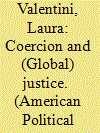

|
|
|
|
|
| Publication |
2011.
|
| Summary/Abstract |
In this article, I develop a new account of the liberal view that principles of justice (in general) are meant to justify state coercion, and consider its implications for the question of global socioeconomic justice (in particular). Although contemporary proponents of this view deny that principles of socioeconomic justice apply globally, on my newly developed account this conclusion is mistaken. I distinguish between two types of coercion, systemic and interactional, and argue that a plausible theory of global justice should contain principles justifying both. The justification of interactional coercion requires principles regulating interstate interference; that of systemic coercion requires principles of global socioeconomic justice. I argue that the proposed view not only helps us make progress in the debate on global justice, but also offers an independently compelling and systematic account of the function and conditions of applicability of justice.
|
|
|
|
|
|
|
|
|
|
|
|
|
|
|
|
| 5 |
ID:
189088
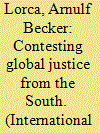

|
|
|
|
|
| Summary/Abstract |
The climate and refugee crises, and of course a global pandemic, attest to the limits that an international order based on sovereign coexistence imposes on efforts to tackle global problems. Not only members of the global civil society, but also states invoke justice to overcome the limits imposed by sovereignty and to enable multilateral cooperation. But what counts as a just solution to global problems? This article shows a sharp North–South divide emerging when the South demands just and equitable solutions that are redistributive from North to South. As the North opposes redistribution, international lawyers and diplomats from the global South have devised legal strategies to circumvent opposition. Rather than appealing only to common goals and cosmopolitan theories demanding deep commitments from states to change the international order, developing countries have sought redistributive opportunities within existing international law. Using their sovereign entitlements, developing countries pursue a combative solidarity to obtain redistribution.
|
|
|
|
|
|
|
|
|
|
|
|
|
|
|
|
| 6 |
ID:
115001
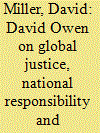

|
|
|
| 7 |
ID:
093002
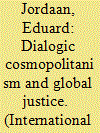

|
|
|
|
|
| Publication |
2009.
|
| Summary/Abstract |
Although the term "cosmopolitan-communitarian debate" never really caught on, a national-global fault line remains prominent in debates about global justice. "Dialogic cosmopolitanism" holds the promise of bridging this alleged fault line by accepting many of the communitarian criticisms against cosmopolitanism and following what can be described as a communitarian path to cosmopolitanism. This article identifies and describes four key elements that distinguish dialogic cosmopolitanism: a respect for difference; a commitment to genuine dialogue; an open, hesitant and self-problematising attitude on the part of the moral subject; and an undertaking to expand the boundaries of moral concern to the point of universal inclusion. While offering much that is attractive, the dialogic cosmopolitan approach ultimately stumbles by failing to include large swathes of the global poor into the transnational moral community it aims to construct and by paying inadequate attention to matters of distributive justice.
|
|
|
|
|
|
|
|
|
|
|
|
|
|
|
|
| 8 |
ID:
182568
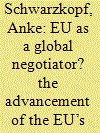

|
|
|
|
|
| Summary/Abstract |
This paper aims to account for the EU’s role in multilateral negotiations at the UNGA by looking at the negotiations on the enhanced observer status. During the negotiation process, the EU experienced significant opposition and had to accept an intermediate setback in form of a postponement of the vote. Despite this, the EU’s enhanced observer status was adopted by the UNGA in May 2011 as resolution 65/276. This research contributes to the understanding of the EU as an actor in multilateral negotiations and the interaction between state and non-state actors. I argue that the EU is in the process of establishing itself as an active and recognized actor at the UN and determining its role as a highly integrated regional organization and non-state entity in the state-centric environment of the UNGA. I analyse the negotiation process and the final agreement through the lenses of a bargaining approach and as an alternative, mutual recognition as global justice.
|
|
|
|
|
|
|
|
|
|
|
|
|
|
|
|
| 9 |
ID:
101835
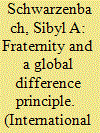

|
|
|
|
|
| Publication |
2011.
|
| Summary/Abstract |
Despite recent cracks in the dominant Hobbesian world picture of international relations (IR) - as the resurgence of neo-Kantianism in the area of 'global justice' bears witness - a discussion of friendship still remains absent. This article focusses on the important debate concerning the possibility of a global 'difference principle': that principle which John Rawls in A Theory of Justice considers an 'expression of fraternity' between citizens. Although in his later work Rawls explicitly denies that his difference principle applies worldwide and between 'people', others (most famously Charles Beitz and Thomas Pogge) defend a global version of it nonetheless. Yet, there is no talk of fraternity by these latter thinkers. I argue that both these positions are mistaken. Not only is an analysis of friendship necessary for any adequate account of justice - whether domestic or global - but the form this political friendship takes emerges as critical to the substantive debate.
|
|
|
|
|
|
|
|
|
|
|
|
|
|
|
|
| 10 |
ID:
137743
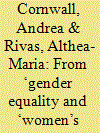

|
|
|
|
|
| Summary/Abstract |
The language of ‘gender equality’ and ‘women’s empowerment’ was mobilised by feminists in the 1980s and 1990s as a way of getting women’s rights onto the international development agenda. Their efforts can be declared a resounding success. The international development industry has fully embraced these terms. From international NGOs to donor governments to multilateral agencies the language of gender equality and women’s empowerment is a pervasive presence and takes pride of place among their major development priorities. And yet, this article argues, the fact that these terms have been eviscerated of conceptual and political bite compromises their use as the primary frame through which to demand rights and justice. Critically examining the trajectories of these terms in development, the article suggests that if the promise of the post-2015 agenda is to deliver on gender justice, new frames are needed, which can connect with and contribute to a broader movement for global justice.
|
|
|
|
|
|
|
|
|
|
|
|
|
|
|
|
| 11 |
ID:
141199
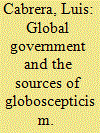

|
|
|
|
|
| Summary/Abstract |
While a number of prominent researchers have recently turned their attention to the likelihood or desirability of full world government, such an ideal has little current support in civic and popular discourse. This article seeks to identify some factors possibly reinforcing such ‘globoscepticism’. After first discussing why it should not be seen as prima facie absurd to support global political integration, and noting widespread popular support in the immediate aftermath of the Second World War, it turns to some findings on the sources of Euroscepticism. This phenomenon involves negative attitudes expressed by political elites and ordinary citizens towards European Union integration. Also considered are the determinants of attitudes towards international trade liberalisation. Insights from both areas can be applied to a preliminary exploration of globoscepticism. Specifically, they can enrich an analysis of domestic biases which naturally arise and are reinforced within a sovereign states system, and which tend to diminish support for comprehensive projects beyond the state. These pose challenges that must be addressed by academic advocates of full global integration, as well as advocates of still-ambitious but far less comprehensive projects of suprastate institution building.
|
|
|
|
|
|
|
|
|
|
|
|
|
|
|
|
| 12 |
ID:
157788
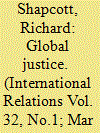

|
|
|
|
|
| Summary/Abstract |
This article argues that global egalitarian accounts of global justice are insufficient and inappropriate to the task of thinking globally about justice. This article argues that the most pervasive approaches to cosmopolitanism, and in particular global egalitarian accounts, are of limited utility because they assume the existence of suitable preconditions which are absent, in particular the lack of a global reflective equilibrium. In so doing, they ignore the requisite precondition for their own thought to be either persuasive or possible as a basis for genuine conduct or institutional reform. This article argues that the task for cosmopolitan thought is to think about how cosmopolitanism can in the words of Richard Rorty be ‘shaped rather than found’ and what that would mean for how we construct accounts of global justice and other pressing cosmopolitan issues. It concludes that developing a theory of global justice requires at least a theoretical engagement with non-Western political thought.
|
|
|
|
|
|
|
|
|
|
|
|
|
|
|
|
| 13 |
ID:
092656
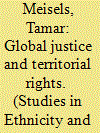

|
|
|
| 14 |
ID:
115712
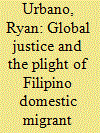

|
|
|
|
|
| Publication |
2012.
|
| Summary/Abstract |
Recent labor migration from third-world countries can be symptomatic of an unjust global order. In a third-world country like the Philippines, this unjust global order can be exemplified in the plight of its overseas migrant workers. This paper specifically examines the case of Filipino domestic migrant workers vis-à-vis global justice in the light of Thomas Pogge's institutional moral analysis. Its key claim is that the present global set-up is a determining cause of global injustice that engenders global poverty. As a result, scores of Filipinos, mostly women, are driven to engage in domestic labor abroad that exposes them to certain grave risks. It further argues that poverty in third-world countries like the Philippines cannot only be explained by domestic factors such as graft and corruption, unclean elections, increasing population, the moral probity and industriousness of the citizens, etc., but also in terms of how the underlying rules of the present global order are unjustly shaped by certain affluent and politically-influential countries. By applying Pogge's institutional moral analysis, this study hopes to understand better the diaspora and plight of Filipino domestic migrant workers in a wider context and provide an alternative to the theory of domestic labor migration.
|
|
|
|
|
|
|
|
|
|
|
|
|
|
|
|
| 15 |
ID:
176140
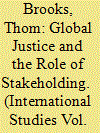

|
|
|
|
|
| Summary/Abstract |
Most research in global justice considers international distributive justice from a perspective of what duties, if any, affluent states have towards people in severe poverty. The debate usually focuses on whether positive or negative duties are most relevant and how they should be applied. This article challenges this orthodoxy by defending stakeholder theory as a promising new approach overcoming limitations in current debates through promotion of the virtue of stakeholders having a say where they have a stake.
|
|
|
|
|
|
|
|
|
|
|
|
|
|
|
|
| 16 |
ID:
085768
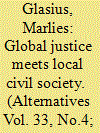

|
|
|
|
|
| Publication |
2008.
|
| Summary/Abstract |
As a new justice institution, the International Criminal Court (ICC) needs to gain legitimacy not just with states but also in civil society, both at the global level and in the societies in which it intervenes. This article, based on interviews, NGO documents, newspaper articles, and participatory observation, looks at civil-society relations with the ICC in relation to its most recent and least publicized investigation-that in the Central African Republic (CAR). It charts the role of civil-society organizations, local and international, in the opening of the investigation, and it discusses the initial responses to the investigation of civil-society figures and victims in the CAR. It finds that unlike in any of the other situations, the ICC's involvement in the CAR has been largely instigated by local civil-society figures and that, as a result, it operates in a quite receptive context. However, the slow pace of investigations and trials, the meager outreach to date, and the court's probable lack of capacity to provide victims with physical and material security are long-term challenges for its ability to meet local expectations of justice.
|
|
|
|
|
|
|
|
|
|
|
|
|
|
|
|
| 17 |
ID:
115197
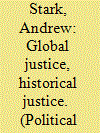

|
|
|
|
|
| Publication |
2012.
|
| Summary/Abstract |
The debates over global and historical justice much preoccupy contemporary political theory. Yet they have not been analyzed in tandem. And this, despite the fact that a number of theoretical frameworks, principal among them contractarianism and utilitarianism, configure arguments in both debates. In this essay, I show that such arguments, as advanced by either side in each of the two debates, all rest on a set of patterned assumptions about the nature of the self. Specifically, I argue, the debates over historical and global justice resemble each other as parallel contests over the physical, meta-social, metaphysical and social natures of the self. At their cores, the debates over historical and global justice thus display a common and symmetrical structure. I will also show that certain conceptions of the self underlying both the anti-historical justice and the anti-global justice positions are mutually inconsistent. Similar contradictions do not beset the pro-historical and pro-global justice positions.
|
|
|
|
|
|
|
|
|
|
|
|
|
|
|
|
| 18 |
ID:
170263
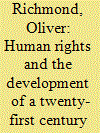

|
|
|
|
|
| Summary/Abstract |
The ‘long peace’ of the last twenty-five years has linked various forms of intervention—from development to peacebuilding and humanitarian intervention—with human rights. This ‘interventionary system/order’ model has premised its legitimate authority on expanded versions of human rights, connected to liberal frameworks of democracy, rule of law, and capitalism in order to connect peace more closely with justice. Human rights offer a tactical way forward for those interested in conflict resolution, but this has led to unintended consequences. Unless conceptions of rights are continually expanded as new power structures and inequalities are uncovered and challenged, philosophical and material matters of distributive and historical justice will remain.
|
|
|
|
|
|
|
|
|
|
|
|
|
|
|
|
| 19 |
ID:
115198
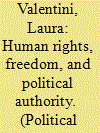

|
|
|
|
|
| Publication |
2012.
|
| Summary/Abstract |
In this article, I sketch a Kant-inspired liberal account of human rights: the freedom-centred view. This account conceptualizes human rights as entitlements that any political authority-any state in the first instance-must secure to qualify as a guarantor of its subjects' innate right to freedom. On this picture, when a state (or state-like institution) protects human rights, it reasonably qualifies as a moral agent to be treated with respect. By contrast, when a state (or state-like institution) fails to protect human rights, it loses its moral status and becomes liable to both internal and external interference. I argue that this account not only steers a middle course between so-called natural-law and political approaches to human rights but also satisfies three important theoretical desiderata-explanatory power, functional specificity, and critical capacity.
|
|
|
|
|
|
|
|
|
|
|
|
|
|
|
|
| 20 |
ID:
106415
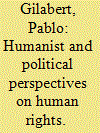

|
|
|
|
|
| Publication |
2011.
|
| Summary/Abstract |
This essay explores the relation between two perspectives on the nature of human rights. According to the "political" or "practical" perspective, human rights are claims that individuals have against certain institutional structures, in particular modern states, in virtue of interests they have in contexts that include them. According to the more traditional "humanist" or "naturalistic" perspective, human rights are pre-institutional claims that individuals have against all other individuals in virtue of interests characteristic of their common humanity. This essay argues that once we identify the two perspectives in their best light, we can see that they are complementary and that in fact we need both to make good normative sense of the contemporary practice of human rights. It explains how humanist and political considerations can and should work in tandem to account for the concept, content, and justification of human rights.
|
|
|
|
|
|
|
|
|
|
|
|
|
|
|
|
|
|
|
|
|